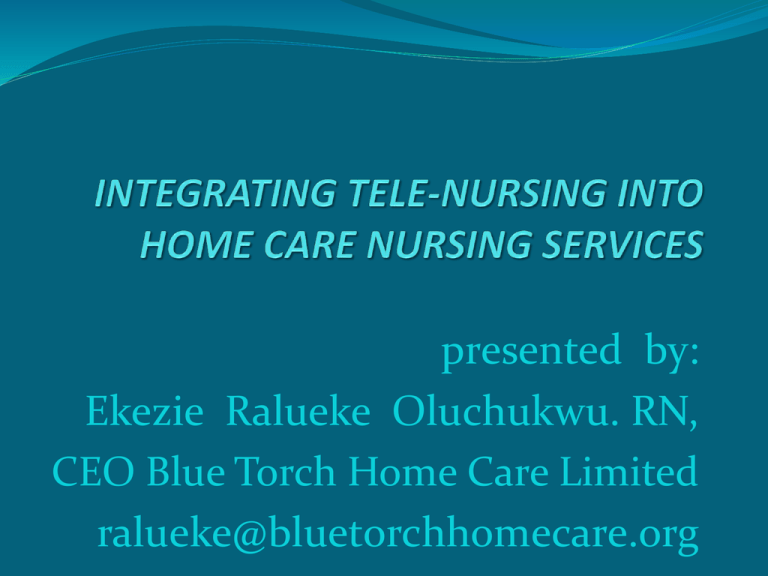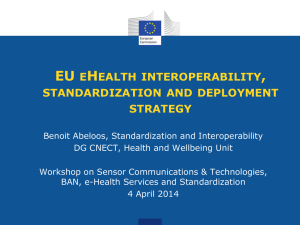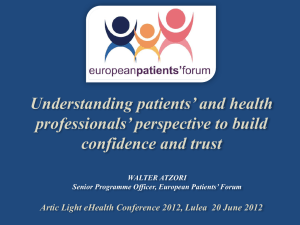Integrating Telenursing into Home Care
advertisement

presented by: Ekezie Ralueke Oluchukwu. RN, CEO Blue Torch Home Care Limited ralueke@bluetorchhomecare.org Abstract Tele-health integration into home care Nursing is a revealing mirror in the health care system , producing the image visibility , stability, sustainability with importance of Information and Communication Technology (ICT) in Home Care Nursing Practices and health care system at large. According to (Global observatory for eHealth series,20011-vol.3), Personal Digital Assistance (PDAs) plays a pivotal role in the health service delivery both at Nurses Station and Home care in many settings in Canada .This paper examines: The use of mobile and electronic devices such as mobile, audio, video cameras and PDAs in the coordination of home care of patients. Tele-nursing practices in home care, showcasing its benefits, stability, delivery models, quality assurance barriers and regulation in the Nigerian settings Best factors needed for sustainable Tele-Home care nursing practices. Novel Technologies, knowledge and skills needed for the adoption of Tele-health in home care nursing, in order to increase coverage and optimize home care delivery. presentation objectives: Overview of Tele-Home Care Nursing Benefits of Tele-Home Care Nursing in Nigeria Barriers to Tele-Home Care Nursing Sustainability of Tele-Home Care Nursing overview The need for Tele-Home Care Nursing Technologies Needed in Tele-Home Care Nursing Practice of Tele-Home Care Nursing Implication of Tele-Home Care Nursing in Nigeria Benefits of Tele-home care nursing Improved quality of nursing care Health education of clients Improved coverage of nursing services Improved disease monitoring Improved management of patients health records through electronic data system Supplements for Human resource demand in Nursing Job satisfaction Encourages self care dependency and privacy Barriers to the practice of Telehome care Nursing Availability of needed technology Acceptance by the populace Level of awareness Financial commitments and payment models Ethical issues surrounding Tele-Home Care Nursing Language barrier Availability of Tele-Nursing institutions Sustenance of Tele-Home Care Nursing Provisions of avenue for exchange of intellectual resources Provisions of needed Technology for Telenursing practice Commitments towards publicity and acceptance Funding Encourage more Tele-health practicing organizations in Nigeria Provisions for Tele-health regulation and policy NEEDS OF TELE-NURSING AWEARNESS TECHNOLOGY TELENURSE CLIENTS FUNDS Conclusion In the wake of information and communication Technology (ICT), and its dominance in the health sector, it is important that its adoption in the Home care Nursing is prioritized, gearing to the strides of practical services being supported by simple combinations in button to improve the lives of patients. FLOW CHART OF TELE-NURSING CLIENT/PATIENT TELE-NURSE CONSULTATION DOCTOR References 1. Mhealth :New Horizon for Health through Mobile Technology: Second global survey on eHealth,WHO Global Observatory for ehealth.(2011) Vol-3. Pp. 56-57. 2. National Association for Home care & Hospice [NAHC]:2008.Basic statistics About Home Care 3. Ontario Home Care Association [OHCA]:(2011).Home Care Nursing in Ontario. 4. Tarricone,R.,& Tsouros,A.(Eds).(2008).The Solid Facts :Home care in Europe,World Health Organization. Resources for health Practitioners Integrated Management for Emergency and Essential Surgical Care (IMEESC) tool kit. Health Information For All 2015 (HIFA2015). mHealth Working Group. ICN Telenursing Network. Global Alliance For Nurses and Midwifery. ETC. Thank-you












